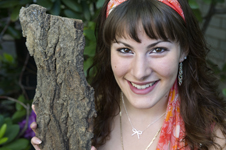Kassi Stein, member of the MHS of 2009, has a passion for research. Right now she is researching the Asian Longhorned Beetles, not good news for them.
Asian Longhorned Beetles, native to China, are an invasive species that can be devastating to deciduous trees. Here in Massachusetts they prey on Maples. In late summer of 2008 the City of Worcester became infested. The beetles affected 62 square miles around the city and, unfortunately, as with many agricultural blights, detection can only be made once the damage is done. To prevent the beetles from spreading a lot of potentially healthy trees are destroyed. Worcester tagged 1800 trees for destruction. Drastic as that may seem, the longer term economic and environmental impacts are much worse. “This insect scares us to death because if it ever got loose in the forests of New England, it would be just about impossible to contain and it’d change the landscape dramatically,” said Tom McCrum, coordinator of the Massachusetts Maple Syrup Association. (Ravenous Asian Beetles Devour New England Trees – Associated Press 10/23/1008).
This is the problem Ms. Stein is attacking.
Ms. Stein, a chemical engineering major who recently completed her freshman year at Northeastern University, participated in the Gordon Engineering Leadership Scholar Program. This afforded her the opportunity to work with Professor Carey Rappaport with whom she co-authored a published paper “Microwave Sensing of Maple Trees for Pest Detection.” The goal is to use innovative radar and sensor technologies that will enable early detection of this pest.
Chemical Engineering? That is not exactly the first profession a high school senior might consider. So how did that come about? We spoke with Ms. Stein about that, her research and her time at MHS.
The explanation is simple. As with many students, the initial spark was a blend of teacher, subject, and assignment. Ms. Stein was sitting in Ms. Mulvey’s freshman Biology class at Milton High when they took up a unit on genetics. They studied Tay-Sacks Disease, a tragic disease in which fatty enzymes build up in the brain. Children with Tay-Sachs rarely live to see their 7th birthday. Stein watched, listened and wondered, “What if something could be done?” And that is when the research bug bit. Stein initially considered becoming a doctor; but “blood made me pass out. That ended that career track.” Research looked like a good fall back.
Upon being accepted at Northeastern, Stein contacted the Gordon-CenSSIS center, Northeastern’s technology research center, expressed her interest in research and asked if they had any opportunities in biological applications. She was told, “Let us get back to you.” They did, “Here’s the deal – Asian Longhorned Beetles . . . they kill Maple trees.” And so her college research endeavor began; tackling a significant environmental issue that threatens a $64 billion dollar industry.
You might be surprised to learn Ms. Stein considered herself quite shy in high school. That was until she joined the Poetry Club her sophomore year. The Poetry Club “was my favorite thing about Milton High . . . [it was] a confidence builder [and] a great way to share what we had been doing. It was good for us because it gave us a good feeling. It was wonderful.”
Stein, who was the Valedictorian for her class, understands the pressures on high schoolers entering their senior year. Her advice is “don’t get caught up in the [college] reputation factor. Honestly, wherever you go, if you want to learn something, you are going to learn. Go after a school that has something you can connect with . . . the prestige is not going to get you what you want. At the end of the day you want to be someplace that can be good for you.”
Has Northeastern been good for her? “I love it!”
Related links:
- Recent item from the Boston.com on the issue: Help the Common: Hunt for Beetles
- Profile of Kassi and her research from news@Northeastern: A passion for problem solving, and saving trees
